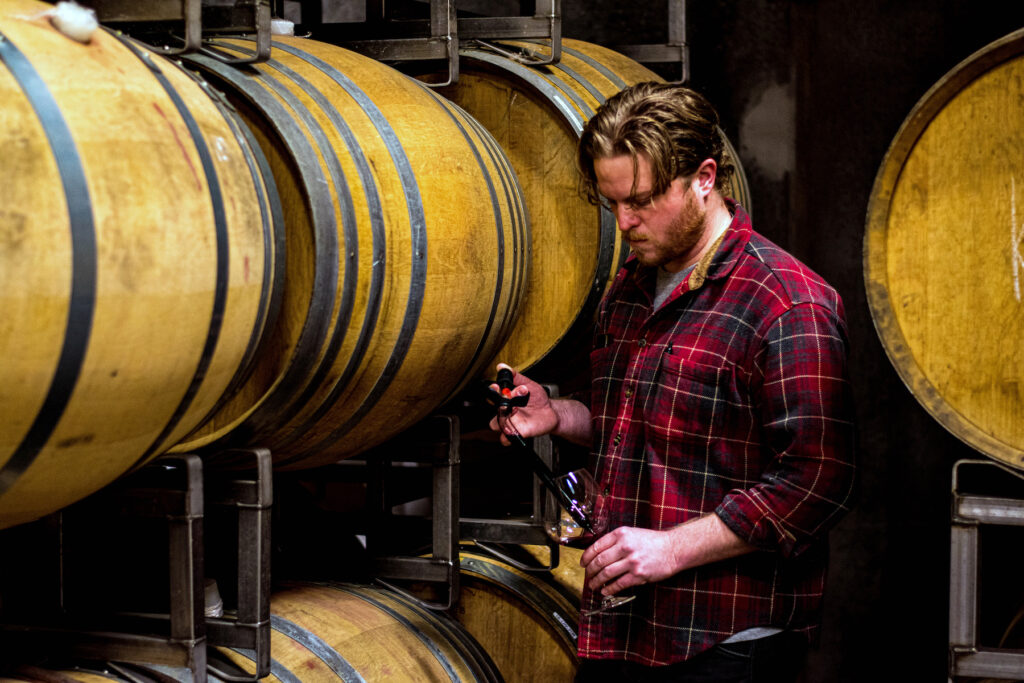
SALEM, Ore. — When you start a wine brand to build something that will span generations and sustain a community rather than building something to merely make money, suddenly, everything is possible. This is the backdrop of Audeant, winemaker Andrew Riechers and proprietor Teal Walker.
They named their brand for the Latin concept of taking risks as part of an adventure. It’s a name aptly chosen by the team to serve as a beacon for how they would continue to take risks in their approach to both winemaking and vineyard sourcing.
It also can serve as a metaphor for Riechers’s path to his own wine label. It’s also a way to connect the collective experience of stepping into the unknown with Walker.
The results are remarkable, predictable and nearly immediate. In just under three years since their inaugural release, the Audeant portfolio has consistently received high acclaim from top wine publications for its classically produced, elegant wines. Last summer, they took top honors in London at the Decanter World Wine Awards for the Audeant 2017 Pinot Noir, earning a platinum medal and 97 points.
“I try not to calibrate my feelings on the wines I make around their critical reception,” Riechers says, “but for the work to stand out in that crowd, to that group of tasters, was a remarkable recognition. I’m very grateful.”
A blend of Nysa, Luminous Hills and Carlisle’s Crest vineyards, the $50 bottle proved to be one of the highest-rated wines in the world with only 179 of the 18,094 entries into the Decanter judging achieving the status of platinum. The panel of more than 160 experts included 44 Masters of Wine and 11 Master Sommeliers, and they spent 15 days evaluating wines from 56 countries.
“We are beyond excited to see our wines appreciated by the world’s most influential and experienced wine industry professionals,” Walker said. “We started Audeant with the intention of making wines that would rival the best in the world, and in just a few short years since our first release, here we are. I am so proud of Andrew and send a thank you to all the judges that weighed in at the Decanter World Wine Awards. It is truly an honor.”
From ‘Candyland’ back to Willamette Valley
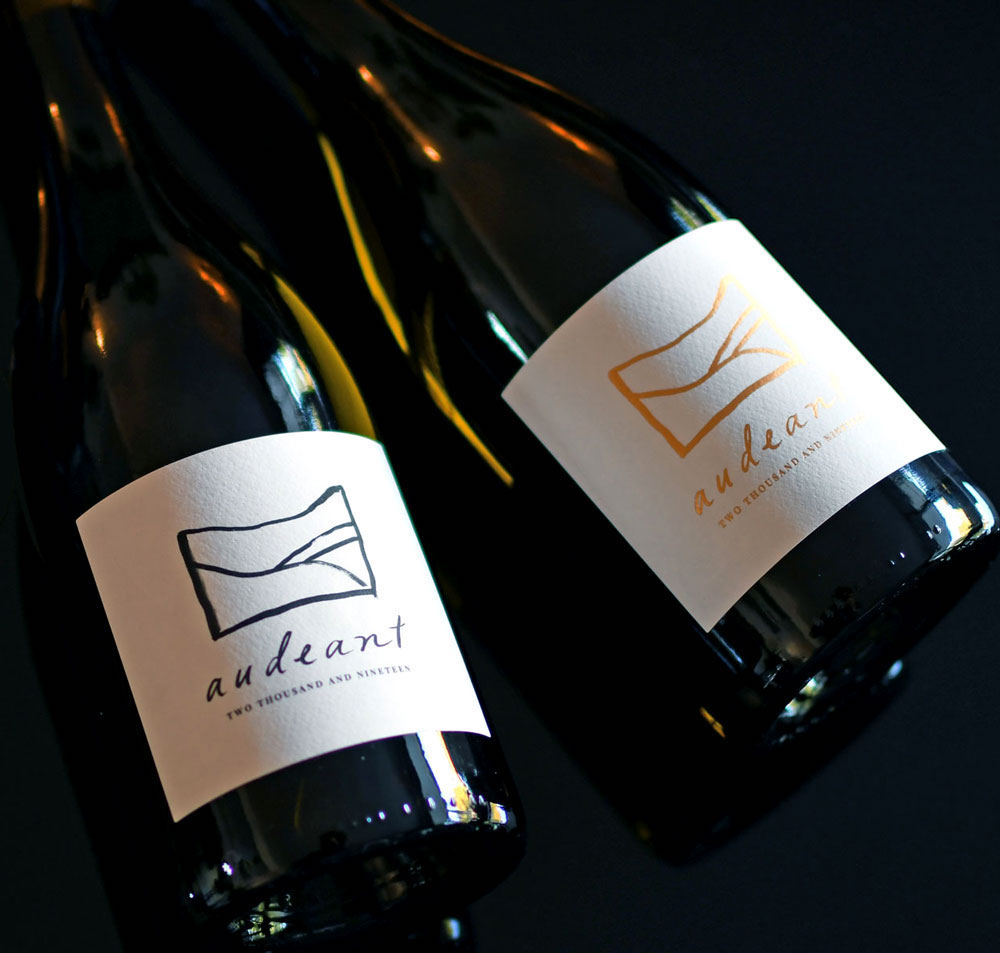
“We are beyond excited to see our wines appreciated by the world’s most influential and experienced wine industry professionals, “ Walker said. “We started Audeant with the intention of making wines that would rival the best in the world, and in just a few short years since our first release, here we are. I am so proud of Andrew and send a thank you to all the judges that weighed in at the Decanter World Wine Awards. It is truly an honor.”
Riechers will humbly tell you that he’s a two-time college dropout. And though he has studied both enology and viticulture, he is perhaps more a student of life. His experiences have taken him to some of the finest wine regions, producers and mentors.
“I am happy with that path,” Riechers says. “I backfilled the textbook knowledge along the way and applied experiential knowledge.”
He grew up in Eugene, practically around the corner from the vineyards of King Estate. It was where he was first impressed by the process of growing vines, a notion he romanticized at the time, but he was determined to escape his hometown and headed to Santa Barbara, Calif., where he studied viticulture and oenology.
One job led to another when he landed an assistant winemaking position at Sanguis in Santa Barbara. Matthias Pippig was making what Riechers believed to be idiosyncratic, thoughtful wines — “pushing the wine envelope.”
In those early days, while simultaneously working harvest and studying, he knew he had found his calling.
“Working with my hands and all my senses, that never ending variability, it was all so appealing,” Riechers says.
He returned to Oregon for personal and professional reasons. He likes green things, the rain, the seasons. Ultimately, he appreciates the variables of harvest in the Willamette Valley.
“Santa Barbara is like Candyland, you can grow anything you want, pick when you want. You have to be an idiot to not make good wine there,” Riechers says.
Already friends with Jim Prosser of J.K. Carriere, he worked harvest for Prosser and stayed in Oregon for a couple of years before setting off to work harvest in New Zealand and then in Burgundy in 2010.
Having only the vaguest conception of what natural wine was, Riechers went to work for someone on the forefront of that movement — Claire Naudin of Domaine Naudin-Ferrand.
“The way wine is thought about in France is legacy — a sustaining model that sustains families through generations,” Riechers said. “It’s not just building a thing to make money, but with the intention to sustain a community.”
After the 2010 harvest, he traveled through France, tasting wines and experiencing Alsace, the Rhône, Burgundy, Beaujolais.
“I came back broke but rich in experience,” he says.
5 years at Antica Terra sparks Riechers
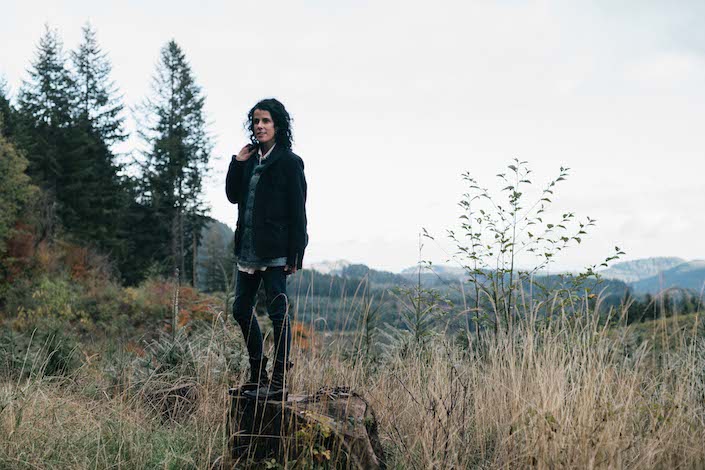
He began to think about making Pinot Noir and Chardonnay in Oregon. It wouldn’t be for a big brand, but he knew he wanted more exposure and experience. An invitation to work harvest for Maggie Harrison at Antica Terra, one of the West Coast’s cult producers of Pinot Noir, changed his life, leading to five years and a role as assistant winemaker.
“Maggie’s tone sets the tone for the place,” Riechers says. “She has the best taste — it’s the best compliment I can give her. She seeks out the most beautiful food and the most tender way to host guests at the winery.”
The culture of Antica Terra — both how business and how hospitality is conducted — left an impression on him.
He describes Antica Terra as a “curious place,” an environment where the team was encouraged to seek out the answer to the question: What’s possible? He learned to develop a curiosity and sensitivity to possibilities.
“Some wineries are myopic; they don’t drink a lot of other wines,” Riechers says. “At Antica Terra, we were drinking a lot of idiosyncratic wines from all the tiny corners of the world to further our understanding and appreciation.”
To Riechers, the real takeaway was how they allowed their vulnerability and sensitivity to be affected by the work they were doing.
“There was no dogma,” Riechers says. “Those people are making some of the greatest wines coming out of this corner of the world.”
Riechers inspires Walker to invest
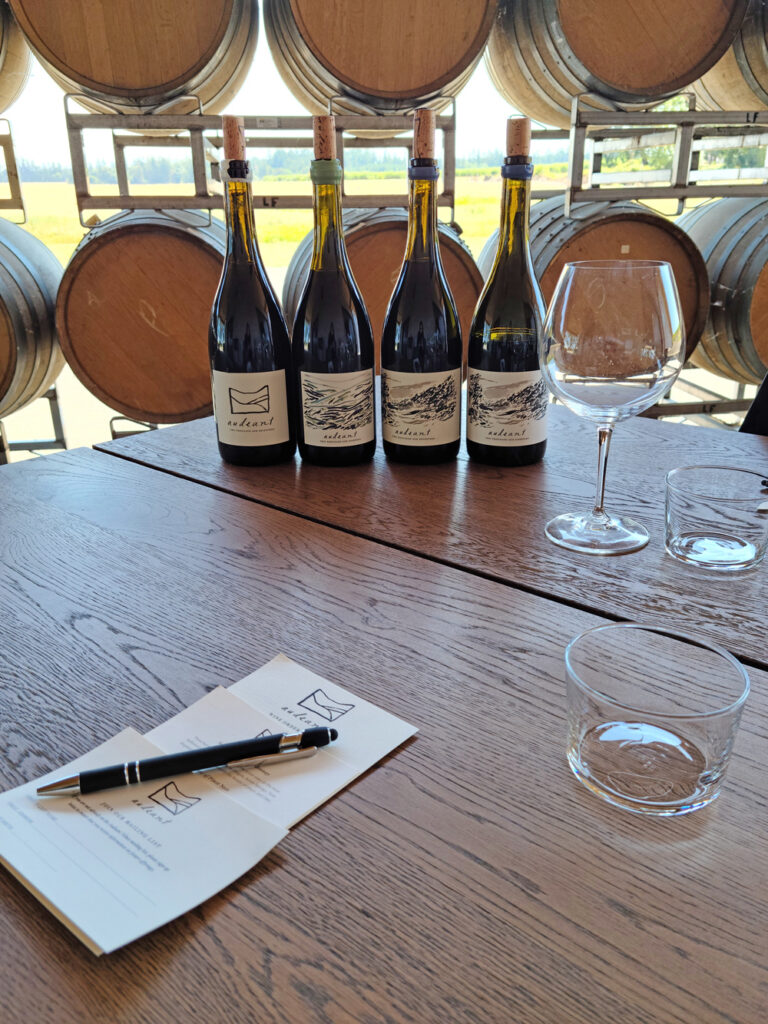
Walker, a graduate of Indiana University’s business school, and her partner already were fans of Antica Terra wines, but it was in 2015 when they fell in love with the beauty and rawness of the Willamette Valley as well as the sense of community apparent at every winery they visited. Seeing so much growth potential, they briefly discussed investing in a small piece of land in the valley. But she never imagined that it would lead to her starting a winery.
“That all changed the following day,” says Walker, “when we showed up at Antica Terra expecting to meet Maggie Harrison, and instead, in walks her assistant winemaker, Andrew.”
The one-hour planned tasting spanned more than three hours. After returning to her Chicago home, Walker kept in touch with Riechers and subsequently flew back to Oregon to meet with him, look at land and agreed to join forces and start a small brand.
Riechers would make all of the winemaking decisions. Walker, with her background in high-tech, would focus on the business. They did not immediately find the home for Audeant, so they decided to source fruit from a few special sites in the valley — relationships they’ve maintained.
Parrett Mountain parcel yields 17 acres of vines
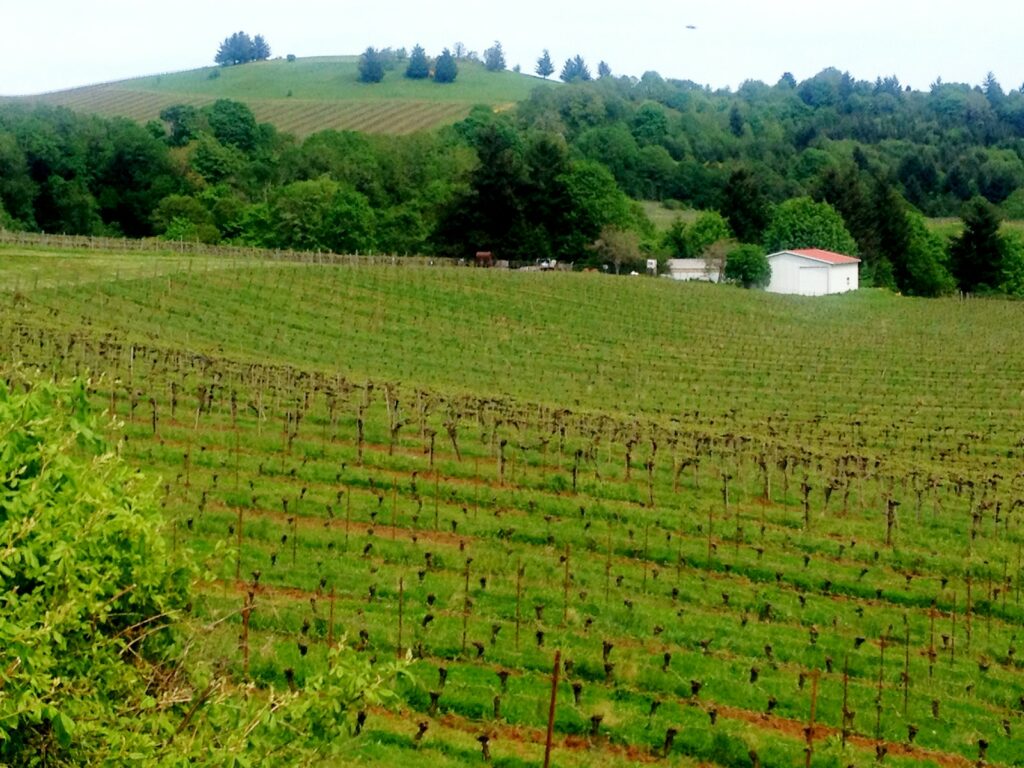
The North Willamette Valley’s diversity of vineyards and a variability of vintages are reflected in the approach of Audeant Wines. They have 12 acres of vineyard on Parrett Mountain — coincidentally (or not) — around the corner from J.K. Carriere, where Riechers’s wine journey began. Intrigued by cool-climate viticulture and high-elevation sites, Riechers searched for some place special before purchasing this property, which rises to 1,100 feet in elevation. Not only because he felt the site would make compelling wines, but he also thought it to be important with the impacts of climate change.
“I’m interested in wines that are growing in the margins,” he says. “They have the most tension, the most acidity. This marginal site just had a certain appeal.”
It’s a rocky site, with a range of aspects, including east- and southeast-facing slopes dominated by Nekia soil. Audeant will be receiving its first fruit in 2022.
Jessica Cortell, who worked with Riechers at Antica Terra, manages the viticulture for Audeant and consults on blocks of purchased fruit. Their single-vineyard bottlings are made from some of the top vineyards in the region – Seven Springs, Nysa, Luminous Hills – sites revered for their terroir transparency.
“She’s a savant,” he says. “She has this innate sensitivity; she walks into a place where things are growing and just gets it. She’s dedicated in how she treats her people and growing healthy vines. There really wasn’t any other choice.”
Even Audeant’s labels are thoughtful and purposeful. He met Shiela Laufer, a Portland artist, and discussed aesthetics as well as their mutual appreciation for the work of the late Andrew Wyeth. The logo and Audeant script is simply Laufer’s handwriting and drawing. The two single-vineyard wine labels are from paintings Laufer made for them.
“Oregon is basically a kaleidoscope of potential expression, a range of color, whether that’s vintage to vintage or site to site,” Riechers says.
Tastings are by-appointment only, orchestrated through Walker, and always one-on-one with Riechers. While building methodically, Audeant quickly is making a name with collectors and critics as a top-tiered producer crafting some of the world’s finest examples of Pinot Noir and Chardonnay. May they dare.
Audeant Wines 2019 Luminous Hills Vineyard Pinot Noir, $70: From two blocks at winemaker/grower Byron Dooley’s dramatic vineyard in Yamhill-Carlton, planted high in the foothills of the Coast Range, it provides tart red and blue fruit, black tea and inviting elements of forest floor. Silky and intense, yet approachable with a lovely lingering finish.
Audeant Wines 2019 Nysa Vineyard Pinot Noir, $85: From 31-year-old, own-rooted vines planted in deep Jory soil of the Dundee Hills, elements of blackberry, violets, white pepper and savory charcuterie capture your imagination. Bright and ethereal, the wine achieves a lovely balance emphasizing the distinctive character of the site.
Audeant Wines 2019 Seven Springs Chardonnay, $75: Riechers and Walker created a Chardonnay of astounding depth and resonance from this special place in the Eola-Amity Hills. Expect flint, green apples, ripe quince, dried honeysuckle and roasted nuts. The core of fruit and textural components slowly unwind in this beautifully balanced, all-too quaffable wine. Cortell works with the Biodynamically farmed Seven Springs.
- Audeant Wines, 9675 Hopewell Road NW, Salem, OR 97304, Audeant.com, (773) 255-1184.

Leave a Reply